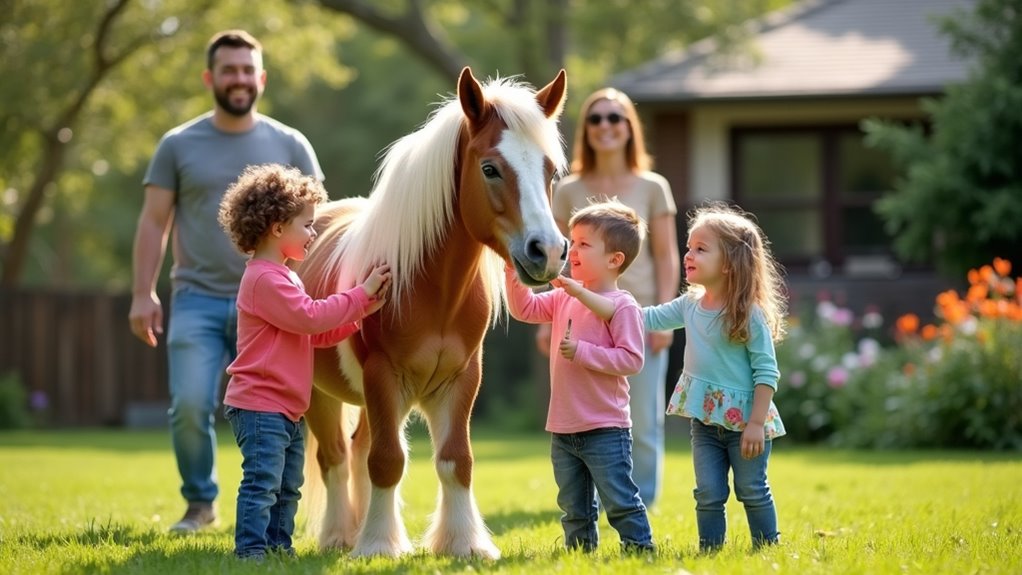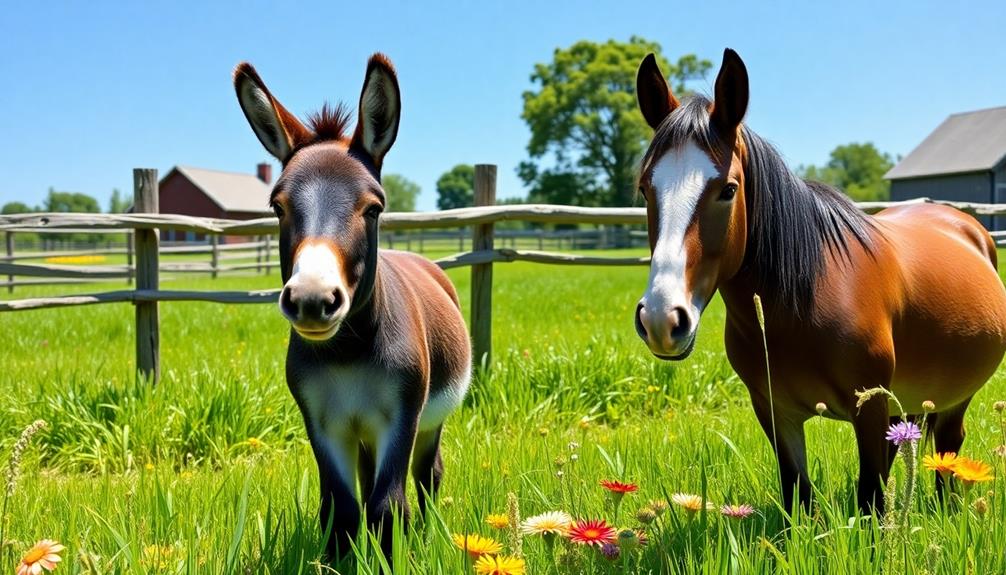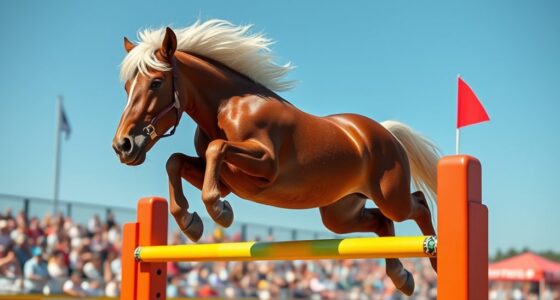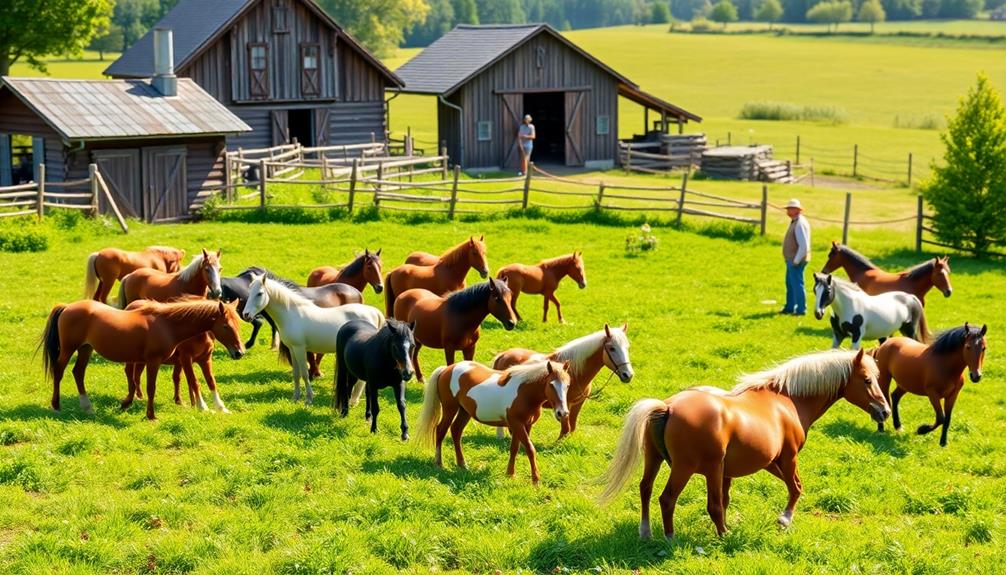Mini horses can be wonderful family pets if you’re prepared to meet their needs. They are affectionate, intelligent, and enjoy interacting with people, making them great companions. Proper grooming, a safe environment, regular veterinary care, and a balanced diet are essential to keep them healthy and happy. With patience and consistent care, they form strong bonds with their families. Want to discover more tips on caring for these charming animals? Keep exploring to learn how to give them the best life.
Key Takeaways
- Mini Horses are affectionate and social, forming strong bonds with family members.
- They require regular grooming, veterinary care, and proper environment, suitable for dedicated owners.
- Their intelligence and trainability make them engaging and interactive pets for families.
- They need safe fencing and shelter, making them better suited for homes with ample space.
- With proper care, Mini Horses can be gentle, loyal companions that enrich family life.
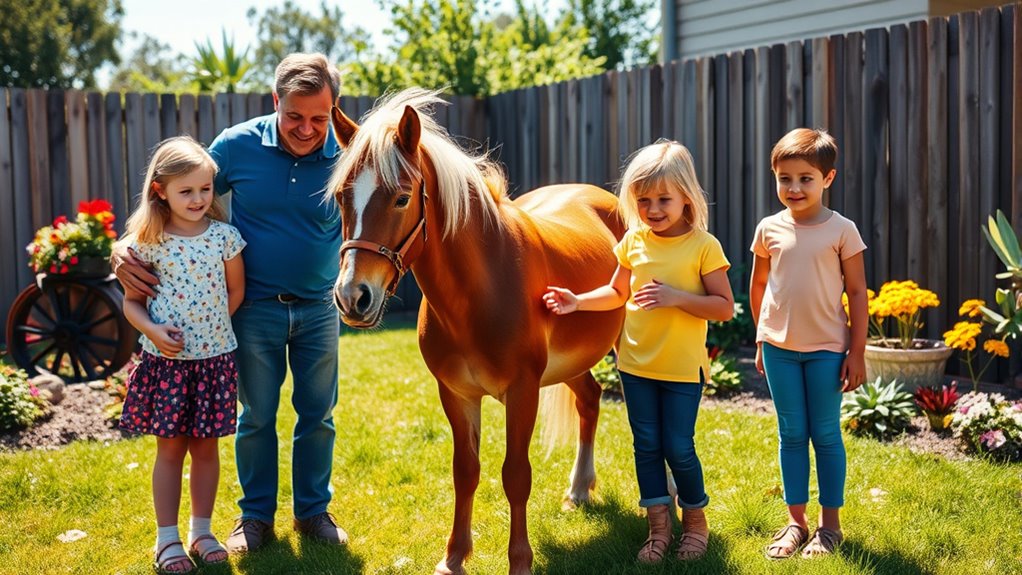
Mini horses have become popular family pets because they are affectionate, intelligent, and relatively easy to care for. If you’re considering welcoming one into your home, it’s important to understand what caring for a mini horse entails. These small animals thrive with consistent attention to horse grooming and veterinary care. Regular grooming isn’t just about keeping their coat shiny; it helps you check for cuts, irritations, or signs of illness. Brushing their coat, trimming hooves, and cleaning around their eyes and ears should become part of your routine. Proper grooming not only keeps your mini horse looking good but also strengthens the bond between you both. It’s essential to use the right tools and be gentle, making grooming a positive experience for your pet. Developing a routine can also help prevent small mistakes from leading to larger health issues. Additionally, understanding flat iron bike can help you create a comfortable environment for your mini horse indoors and outdoors. Maintaining proper storage of supplies ensures that grooming tools and veterinary products stay in good condition and are readily accessible. Veterinary care is equally important, as mini horses need routine health checks, vaccinations, and dental care. Unlike dogs or cats, they often require specific equine veterinary services, so finding a veterinarian experienced with small horses is crucial. Regular check-ups can catch health issues early, saving you from costly treatments later on. Mini horses are generally hardy, but they’re still susceptible to certain conditions like laminitis or dental problems, which can affect their overall happiness and longevity. Keeping up with vaccinations and parasite control is vital, especially if your mini horse spends time outdoors. You should also monitor their weight to prevent obesity, which can lead to other health issues. Providing a balanced diet and appropriate exercise helps maintain their health and vitality. Paying close attention to their emotional well-being can also lead to a happier, more content companion. Creating a safe and enriching environment, including proper shelter and social interaction, is essential for their mental health. A suitable environment that mimics natural conditions can greatly improve their overall quality of life. Caring for a mini horse involves more than just grooming and vet visits; it’s about creating a safe, engaging environment. These intelligent animals respond well to training, so teaching them commands or tricks can be a rewarding experience for your family. They are social creatures and thrive on interaction, so spending quality time with your mini horse strengthens your bond and keeps them happy. Ensure they have access to a clean, safe pasture and shelter from extreme weather. Proper fencing is also essential to keep them secure. As with any pet, patience and consistency are key. You’ll find that caring for a mini horse requires effort, but the joy and companionship they bring make it all worthwhile. With attentive horse grooming and diligent veterinary care, your mini horse can become a beloved member of your family for years to come.
Frequently Asked Questions
How Much Space Do Mini Horses Need at Home?
Mini horse housing needs to provide enough space for your horse to move comfortably, ideally at least 200 square feet per horse. Space requirements include a clean, dry area for shelter and room for grazing or exercise. You should also consider fencing and access to pasture. Ensuring proper space helps keep your mini horse healthy and happy, making it easier to care for and enjoy as a pet.
Are Mini Horses Suitable for Children of All Ages?
Ever wonder if a mini horse is right for your family? Mini horses can be great pets for children, but you should consider their horse temperament and mini horse cost first. They tend to be gentle and friendly, making them suitable for kids of many ages. However, young children must be supervised, and families should be prepared for the ongoing care and expenses associated with mini horses.
What Is the Average Lifespan of a Mini Horse?
You might wonder about the mini horse’s lifespan, which averages around 25 to 35 years. Proper mini horse nutrition is vital for their health, helping them live longer and stay strong. Good mini horse training ensures they’re well-behaved and comfortable around people. By providing proper care, including diet and training, you can enjoy many happy years with your mini horse and guarantee they live a healthy, fulfilling life.
Do Mini Horses Require Special Veterinary Care?
Imagine gentle mini horses, their sleek coats shining after a good horse grooming session. You’ll need to keep up with their veterinary care, which can include routine checkups and occasional veterinary costs. These small horses require special attention to health issues, just like any other pet. Regular veterinary visits help prevent problems, ensuring your mini horse stays happy and healthy, ready to nuzzle you after a session of grooming.
Can Mini Horses Be Kept Indoors Regularly?
You can keep mini horses indoors occasionally, but it’s not ideal for regular indoor grazing or housing requirements. Mini horses need ample space, proper ventilation, and access to outdoor pasture for exercise and grazing. Keeping them indoors too often can lead to health issues like obesity and hoof problems. To guarantee their well-being, provide a safe, spacious environment with outdoor access and suitable housing that meets their grazing and exercise needs.
Conclusion
So, if you’re ready to welcome a tiny equine tornado into your family, mini horses are truly the ultimate pet. They’ll turn your backyard into a bustling barnyard paradise and make every day feel like a fairy tale come true. Just imagine the joy of having a miniature horse as your loyal, lovable companion—it’s like having a pocket-sized, four-legged best friend who’ll never leave your side. Get ready for a life of endless adventure and adorable chaos!
